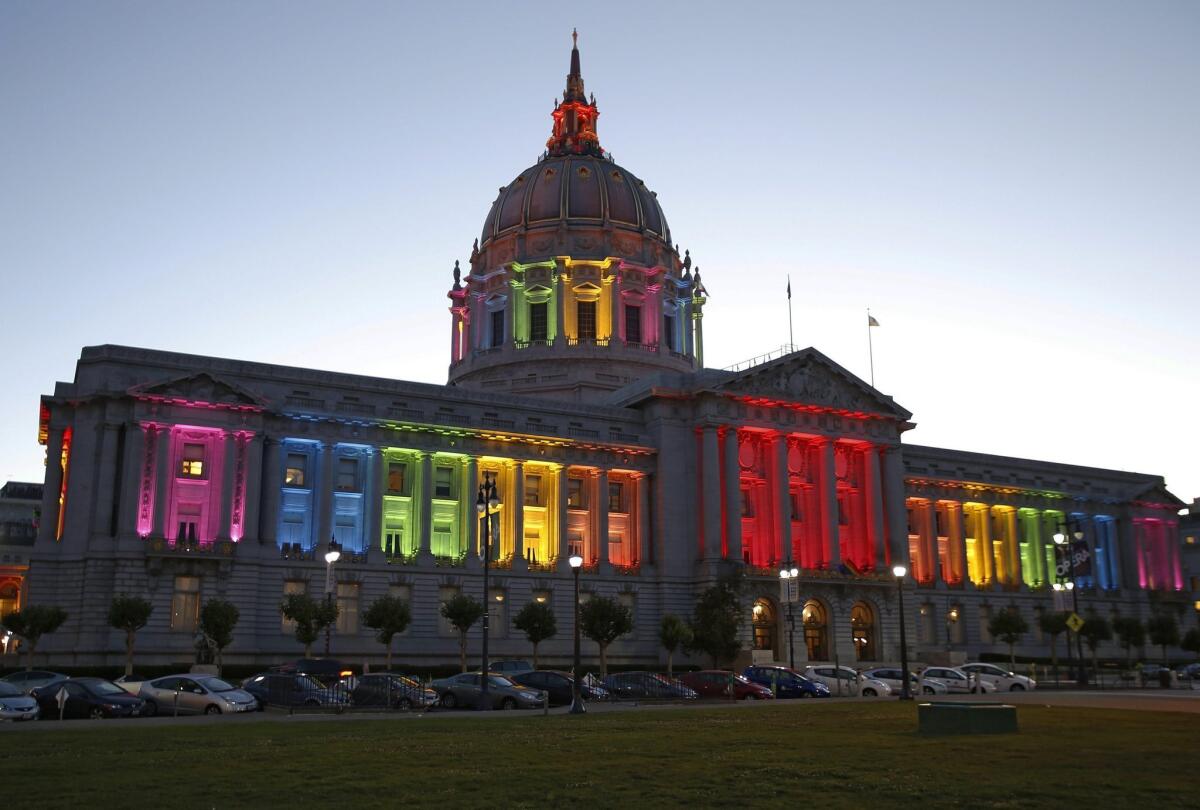Prop. 8 deserved a defense

The Supreme Court’s decision to dismiss a challenge to Proposition 8 on Wednesday followed well-established law with regard to standing in federal court. But the ruling raises a serious question about the future of state ballot measures: Who can defend such measures against legal challenges if state officials won’t?
The initiative process was intended to grant ordinary citizens the ability to draft and pass laws without having to rely on the Legislature, a right that can be especially important at times when the government is not following the will of voters. Although the state officials shouldn’t be required to defend a law that they find indefensible, it also should not be possible for a few government officials to negate ballot measures they disagree with simply by refusing to defend them.
Here’s how we found ourselves in this situation with Proposition 8.
VIDEO: Understanding the Prop. 8 and DOMA decisions
The Supreme Court long has held that Article III of the Constitution allows only an individual who has suffered injury himself to bring a case or appeal in federal court. The harm must be direct and concrete; an ideological interest never has been sufficient to establish standing.
The two same-sex couples who brought the challenge to Proposition 8 unquestionably had standing to sue, with a claim that their constitutional rights had been violated when they were denied the right to marry. The federal district court ruled in their favor, declaring Proposition 8 unconstitutional and issuing an injunction against the state to prevent it from enforcing Proposition 8 anywhere in California. At that point, state officials — as the defendants in the initial action — had the right to appeal, but they elected not to.
The state was certainly within its rights to refuse to defend a law that officials believed to be unconstitutional. Indeed, that is the duty of public officials who have taken an oath to uphold the Constitution. But Proposition 8’s supporters were left understandably upset. A majority of Californians had voted to ban gay marriage in the state, and now the state would no longer defend the law.
DECISION: U.S. Supreme Court on Prop. 8
The supporters tried to step into the void, defending the law themselves, but the U.S. Supreme Court held that they had not been injured in the kind of tangible, direct way that allows them to pursue a legal remedy. They had no standing.
I think this was clearly right as a matter of constitutional law, and I am tremendously pleased that the result will be that same-sex couples will soon be able to marry in California. But the long-term implications of the ruling are disturbing. The state should not be able to nullify an initiative passed by millions of voters simply by choosing not to defend it in court.
Above all, the initiative process exists to ensure that the voters can adopt laws when elected government officials are not sufficiently responsive to them. Allowing a few officials to nullify an initiative by not defending it is inconsistent with the very reason for allowing initiatives in the first place.
FULL COVERAGE: Prop. 8 and DOMA
Here’s how a solution could work.
States such as California, with laws allowing ballot initiatives, should also enact laws requiring that a special attorney for the state be appointed in each instance that the government elects not to defend an initiative. Such a process would be well within the bounds of established law, since states get to decide for themselves who will represent them in court.
Because the attorney, even if not a state employee, would be appointed by the state, he or she would be representing the state and therefore have standing. This sort of appointment of outside counsel already happens in certain other instances, such as when there is a conflict of interest. The only difference here would be that, whenever the state opted not to defend an initiative passed by voters, an appointment would be required.
Such a law would be completely consistent with the Supreme Court’s ruling in the Proposition 8 case. The court held that it has never allowed the supporters of a law to defend it when the state chooses not to do so. With the mechanism I propose, it would still be the state defending the law; it would just be represented by a special attorney, something well within the state’s prerogative and within the Constitution’s requirement for standing.
It is not often that voters will pass an initiative and state officials will refuse to defend it. But it is most likely to happen in situations, such as Proposition 8, in which the matter is highly controversial and deeply divisive. I vehemently opposed Proposition 8, but I believe it deserved its defense in court. California needs a mechanism to make that possible.
Erwin Chemerinsky is dean of the UC Irvine School of Law.
More to Read
A cure for the common opinion
Get thought-provoking perspectives with our weekly newsletter.
You may occasionally receive promotional content from the Los Angeles Times.






